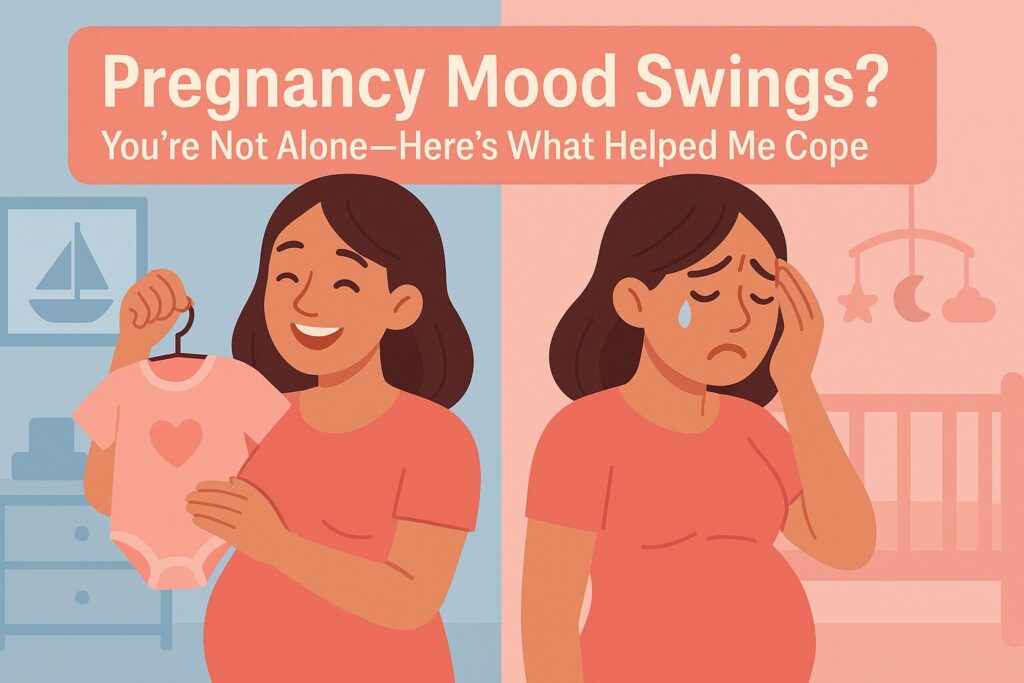The moment my fourth pregnancy test showed positive, I burst into tears of joy. Twenty minutes later, I snapped at my husband for loading the dishwasher “the wrong way.” By evening, I was laughing uncontrollably at a commercial that wasn’t even particularly funny. Sound familiar? If you’re experiencing these rapid emotional shifts, you’re encountering one of pregnancy’s most common yet least discussed challenges: managing pregnancy emotions in all their unpredictable glory.
As both a midwife who’s guided thousands of women through pregnancy and a mom who’s weathered the hormone storms five times myself, I’m here to tell you that what you’re feeling is normal, manageable, and—most importantly—temporary.
Why Am I Crying Over a Commercial? Understanding Pregnancy Mood Swings

Before we dive into coping strategies, let’s understand what’s actually happening in your body and brain when those emotions come flooding in unexpectedly.
The Hormone Hurricane
When you become pregnant, your body experiences one of the most dramatic hormonal shifts it will ever encounter. Within weeks of conception:
- Estrogen levels rise dramatically, affecting mood and brain chemistry
- Progesterone surges, which can have a sedative-like effect for some women while causing anxiety in others
- Human Chorionic Gonadotropin (hCG) doubles every 48-72 hours in early pregnancy
- Oxytocin, prolactin, and other hormones begin preparing your body for nurturing
According to Harvard Medical School research, these hormonal fluctuations directly impact the neurotransmitters in your brain—particularly serotonin and dopamine—which regulate mood, sleep, and emotional responses.
I remember sitting in my car outside the grocery store during my third pregnancy, sobbing because they were out of the specific brand of pickles I wanted. Logically, I knew this was an overreaction, but my body’s biochemistry had temporarily hijacked my emotional responses. Understanding this biological basis was crucial for managing pregnancy emotions without judging myself harshly.
Beyond Hormones: Additional Emotional Triggers
While hormones play a starring role in pregnancy mood swings, several other factors can intensify the emotional experience:
Physical discomfort: Morning sickness, fatigue, back pain, and other physical symptoms can wear down your emotional resilience
Sleep disruption: Many pregnant women struggle with insomnia or uncomfortable sleep, further impacting mood regulation
Life transitions: Pregnancy represents an enormous life change, triggering natural anxiety, excitement, and uncertainty
Relationship adjustments: Partnerships often require renegotiation during pregnancy, creating additional emotional complexity
Financial concerns: The practical aspects of preparing for a baby can create stress
Kelly, a first-time mom I worked with, came to her appointment concerned about crying daily over small things. She was sleeping poorly due to hip pain, worried about childcare arrangements, and experiencing constant nausea. We addressed each factor systematically—improving her sleep position, exploring childcare options, and finding nausea relief—which significantly improved her emotional balance.
The Spectrum of Normal: What Most Women Experience
One question I hear frequently in my midwifery practice is some variation of: “Am I going crazy, or is this normal?” Let me reassure you about what typically falls within the normal range of managing pregnancy emotions.
Common Emotional Experiences Through the Trimesters
First Trimester:
- Unexpected tearfulness or weepiness
- Irritability and short temper
- Anxiety about the pregnancy’s viability
- Mood swings that seem to come from nowhere
- Feeling overwhelmed by normally manageable situations
Second Trimester:
- For many (but not all) women, emotional stability improves
- Increased feelings of connection and joy
- Possible anxiety about upcoming tests or the baby’s health
- Heightened body image concerns as your shape changes
- Beginning to process the reality of impending parenthood
Third Trimester:
- Nesting instincts that may include emotional urgency
- Fear or anxiety about labor and delivery
- Impatience and frustration as discomfort increases
- Emotional preparation for meeting your baby
- Occasional feelings of vulnerability or being overwhelmed
During my fifth pregnancy, I experienced what I call the “second trimester sweet spot”—those golden weeks when nausea subsided, my energy returned, and my emotions felt more balanced. But with my second baby, that emotional equilibrium never quite arrived. Every pregnancy is unique, which is why personalized approaches to managing pregnancy emotions are so important.
7 Strategies for Managing Pregnancy Emotions That Actually Work
Now for the practical part: what can you actually do when you’re in the midst of these emotional waves? Here are the strategies that have proven most effective both in my personal experience and for thousands of women in my care.
1. Validate First, Problem-Solve Later
When emotions hit hard, resist the urge to immediately dismiss or “fix” your feelings. Instead:
- Acknowledge the emotion: “I’m feeling really sad/angry/anxious right now”
- Remind yourself that emotions are temporary visitors
- Give yourself permission to feel without judgment
- Only then consider whether action is needed
During my second pregnancy, I found myself furious when my husband came home late without calling. Before responding, I took a moment to name what I was feeling: “I’m angry, but I’m also scared about doing this pregnancy alone.” This self-awareness helped me communicate more effectively rather than just reacting to the emotion.
2. Build Your Sleep Foundation
Sleep might seem unrelated to emotional regulation, but it’s actually one of the most powerful tools for managing pregnancy emotions.
Try these pregnancy sleep strategies:
- Create a consistent bedtime routine
- Use pregnancy pillows to support your changing body
- Practice relaxation techniques before bed
- Limit screen time in the evening
- Consider a brief afternoon rest period
Maria, normally emotionally steady, found herself crying daily during her pregnancy until we discovered she was getting less than five hours of fragmented sleep each night. After implementing a dedicated sleep routine and afternoon rest, her mood stabilized dramatically within a week.
3. Nutrition for Emotional Stability
What you eat affects your mood more directly during pregnancy than perhaps any other time.
Mood-supporting nutrition:
- Eat small, frequent meals to maintain blood sugar stability
- Include protein with each meal and snack
- Don’t skimp on complex carbohydrates, which support serotonin production
- Stay well-hydrated
- Consider foods rich in omega-3 fatty acids, which support brain health
I noticed during all five of my pregnancies that my emotions were far more volatile when I went too long between meals. Keeping protein-rich snacks in my bag became essential for managing pregnancy emotions during long workdays.
4. Movement as Medicine
Exercise releases endorphins—natural mood elevators that can provide hours of emotional balance.
Pregnancy-appropriate movement:
- Walking, especially outdoors in natural light
- Swimming, which can feel especially freeing as your body changes
- Prenatal yoga, which combines movement with mindfulness
- Gentle dance to express and release emotions
- Stretching to relieve physical tension that can worsen mood
According to The American College of Obstetricians and Gynecologists, regular physical activity during pregnancy can reduce symptoms of depression and anxiety by up to 30% in susceptible women.
Even on my most emotionally fragile pregnancy days, I found that a 10-minute walk could shift my perspective dramatically. The key is finding movement that feels good rather than adding stress to your body.
5. Communicating Your Needs
Pregnancy emotions often intensify when we feel misunderstood or unsupported. Clear communication becomes essential.
Effective communication strategies:
- Use “I feel” statements rather than accusations
- Be specific about what support looks like to you
- Educate key people in your life about pregnancy mood changes
- Set boundaries around triggering conversations or situations
- Ask directly for what you need
Rebecca, expecting her second child, found herself increasingly frustrated with her partner until she realized he simply didn’t understand what she needed. When she directly communicated, “I need you to take our toddler for an hour after dinner so I can rest,” rather than hoping he would figure it out, their relationship tension decreased significantly.
6. Mindfulness Practices for Emotional Waves
Mindfulness—the practice of present-moment awareness without judgment—can be particularly powerful for managing pregnancy emotions.
Simple mindfulness techniques:
- Breath awareness: Simply noticing your breathing for 30-60 seconds
- Sensory grounding: Identifying five things you can see, four you can touch, three you can hear, two you can smell, and one you can taste
- Body scan: Systematically noticing sensations throughout your body
- Thought observation: Watching thoughts come and go without attaching to them
- Brief meditation: Even 3-5 minutes can reset your emotional state
During my most recent pregnancy, I found that setting a gentle alarm to remind me to take three conscious breaths every hour helped maintain emotional balance throughout the day.
7. Professional Support: When Self-Help Isn’t Enough
Sometimes, despite your best efforts at managing pregnancy emotions, you may need additional support. This doesn’t reflect any failure on your part—rather, it shows wisdom and self-awareness.
Consider professional support if:
- Your emotions interfere with daily functioning for more than two weeks
- You experience persistent feelings of hopelessness or worthlessness
- You have thoughts of harming yourself
- Anxiety feels unmanageable or leads to panic attacks
- You have a history of depression or anxiety
Jennifer, a third-time mom with a history of anxiety, proactively connected with a therapist specializing in perinatal mental health early in her pregnancy. This support system allowed her to navigate her emotions more smoothly than in her previous pregnancies.
Partners and Pregnancy Emotions: A Special Note

If you’re the partner of someone experiencing pregnancy mood swings, your role is crucial. The support you provide can significantly impact how successfully your pregnant partner navigates this emotional terrain.
Most helpful partner approaches:
- Listen without trying to fix unless specifically asked
- Validate feelings without dismissing or minimizing
- Educate yourself about pregnancy emotional changes
- Take on additional responsibilities without being asked
- Remember this is temporary and biological
My husband learned over our five pregnancies that sometimes the most supportive thing he could say was simply, “Your feelings make sense. How can I help?” rather than “Don’t worry” or “It’s just hormones.”
When Mood Changes Signal Something More Serious
While emotional fluctuations are normal during pregnancy, sometimes they can indicate conditions requiring professional attention. Understanding the difference is important for managing pregnancy emotions appropriately.
Recognizing Prenatal Depression and Anxiety
Prenatal depression affects approximately 7-20% of pregnant women, yet often goes undiagnosed as symptoms are attributed to normal pregnancy changes.
Watch for these warning signs:
- Persistent sadness or emptiness lasting more than two weeks
- Loss of interest in previously enjoyed activities
- Excessive worry about the baby’s health despite reassurance
- Sleep problems (beyond normal pregnancy disruptions)
- Changes in appetite unrelated to pregnancy nausea
- Difficulty concentrating or making decisions
- Recurrent thoughts of death or suicide
If you experience these symptoms, please speak with your healthcare provider promptly. Both therapy and medication options exist that can be safely used during pregnancy.
Embracing the Emotional Journey
As I reflect on my five pregnancies and two decades of midwifery practice, I’ve come to see pregnancy emotions not as something to simply endure or “manage,” but as an important part of the transformation into motherhood.
These feelings—intense as they may be—are preparing you for the emotional depth that parenting requires. The empathy, vulnerability, fierce protection, and profound love that can feel overwhelming during pregnancy are precisely the emotional tools you’ll need as a parent.
So while these strategies for managing pregnancy emotions can help smooth the journey, also consider embracing these feelings as part of your evolution. When I cried at a diaper commercial during my last pregnancy, my 10-year-old daughter observed, “Mom, you’re just practicing all your feelings so you’ll be ready when the baby comes.” From the mouths of babes—such wisdom!
Your emotional experiences during pregnancy—the tears, the laughter, the fears, and the dreams—are all weaving the complex emotional tapestry of your motherhood journey. With self-compassion, support, and the practical strategies we’ve discussed, you can navigate these emotions while honoring their place in your transformation.
Remember, you’re not alone in this experience, you’re not overreacting, and you’re not losing your mind. You’re simply growing not just a baby, but a mother—and that process touches every part of who you are, especially your heart.



